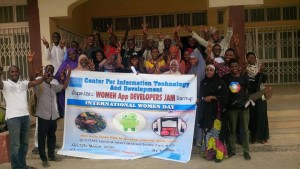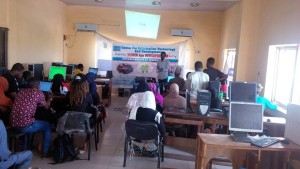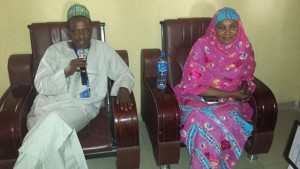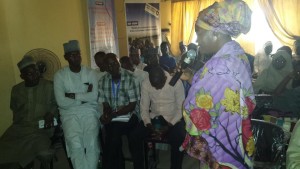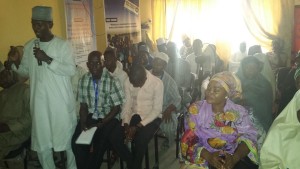TEXT OF PRESS CONFERENCE ADDRESSED BY THE NORTHEAST EDUCATION AND SOCIAL ACCOUNTABILITY CLUSTER ON THE 18TH MARCH, 2016 AT CENTRAL HOTEL, KANO, KANO STATE ON THE DECLARATION OF STATE OF EMERGENCY ON EDUCATION SECTOR BY THE BAUCHI STATE GOVERNMENT
Dear members of the press. We welcome you to this press conference. THE
ACTORS
Members of the Press, we wish to welcome you to this important press conference. We are hereas members of the North East Social Accountability Cluster with the Centre for InformationTechnology and Development (CITAD) as its anchor. The cluster is established with the specialgoal of mobilizing all stakeholders towards improving Social accountability in the educationsector of the northeast with particular focus on promoting reforms that increase access to, andgovernance within the education sector in North East Nigeria.
PRELUDE
North Eastern part of the country is facing many challenges among which the poor state of education iscritical. The region has the worst education statistics in Nigeria. Male adult literacy rate is low with allstates in the region having lower than national average rates. In fact Yobe and Borno have the lowestnationally with 31.9% and 35.1% respectively. The corresponding figures for female adult literacy are14.9 and 18.0% respectively for the two states. The performances of the states in both NECO and WAEC have been the lowest of the country. A Survey showed that percentage of children between 6 and 16 who have never attended school has high prevalence in the following states: Borno 72 percent, Yobe 58 percent and Bauchi 52 percent. Only about 20% of all school age girls get to attend school. The North East zone of the country has certain peculiarities which are that it is the region with the highest rate of maternal mortality rate as well as at lowest on the poverty index. Such high mortality rate is an indication of the poor status of women. The region is also further adversely affected by conflict and insurgency.
Between July and September last year, CITAD commissioned a survey on the state of education in the sixstates of the northeast. The findings confirmed the comatose state of education in the region. The reportfor each state was presented to key stakeholders in the respective states. As part of the efforts to engageall stakeholders towards a collective agenda for the revamping of the education sector in the region, theCluster in December convened a national stakeholder event to present the reports in Abuja. This wasattended by Ministries of Education from all the states, members of legislature from all the states, othereducation related agencies from the states, parents/ teachers associations and representatives of civilsociety organizations. Following deliberation on the reports, participants agreed to, among other things,call on state governments in the north east to declare state of emergency on education. The Bauchi ExampleIt is in this light that we welcome the announcement of the Bauchi State government for declaring state ofemergency on the education sector and the inauguration of a committee that is saddled with theresponsibility of 1. studying and reviewing the existing policies on education in the state 2. to monitor and evaluate the implementation of these policies; 3. to make appropriate recommendations incidental to the assignment of the committee 4. To co-opt any officer that is relevant to the assignment. This committee has been given eight weeks within which to complete the assignment and submitits report to government for quick and immediate intervention in the sector.We commend the Bauchi State Government for taking this wise decision. This is an actionworthy of commendation and we pray that the outcome of the committee’s exercise will lead toimprovement of the education sector of the state. We will like to urge the Bauchi StateGovernment not to rest its oars by just making pronouncement and leaving it at that. Declarationof State of Emergency without bold initiatives and corresponding funding and the deployment oftransparent and accountable mechanisms for the utilization of the funds will come to nothing. We
equally call on both the Government and the State of Emergency Committee to engage all stakeholders such as civil society organizations, parent, community leaders, etc.
A CALL TO THE OTHER STATES
In the same vain we call on the other states of Adamawa, Borno, Gombe, Taraba and Yobe totake the same step as that of Bauchi so as to release the educational sector of the region from the brink of total collapse. This call is necessary at this time considering the fallen standard of education in the region and the need to address that to free the region from other problems thatpoor status of education have given birth to.Signed:
1. Isah Garba, Bauchi Coalition for Improvement of Public Expenditure Management(BACIPEM), Bauchi. 08064867312
2. Kabiru Sa`idu Dakata, Centre for Information Technology and Development (CITAD),Kano. 08064891110
3. Mohammed G. Wuyo, Borno Coalition for Democracy and Progress (BOCODEP),Borno. 08063309633
4. Enoch Raymond, Centre for Environmental Education and Development (CEED),Taraba. 07065550217
5. Rebecca Hassan, Association of People Living with Disability, Gombe. 08036582745
6. Aishatu Margima, Women and Youth Empowerment for Advancement and HealthInitiative (WYEAHI), Adamawa. 08025225194
\7. Halimatu Laminu, Network of Civil Society Organizations, Yobe. 08025561637
8. Dauda Mohammad, Northeast Youth Initiative Forum(NEYIF), Yobe. 08035548664
9. Asma`u Joda, Centre for Women and Adolescent Empowerment, Adamawa.08032917070
10. Ibrahim Yusuf, Society and the Future, Gombe. 08061153231



